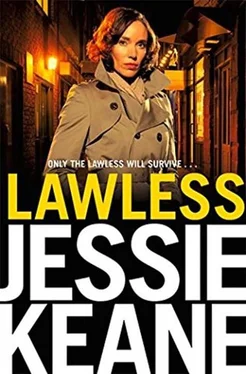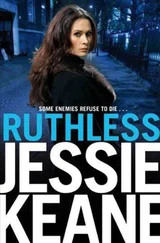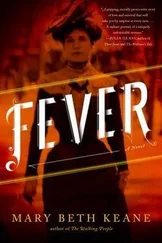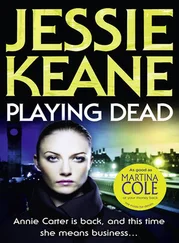‘So who the hell did it? If they didn’t?’ he said aloud, and clutched at his head.
‘We don’t know. But for sure we have to find out,’ said Rob.
Rob knew how badly Michael’s passing had hurt Kit. It was as if he’d been locked into a downward spiral ever since, added to which he now had Vittore out for his blood. The way things were going, Kit wouldn’t live long enough to track down Michael’s killer. Kit and Rob had almost grown up together working for Michael. He didn’t want to lose him.
I’ll watch his back, he promised himself. What more can I do?
‘Where do we start?’ asked Kit. ‘We don’t have a fucking clue, do we?’
‘He had enemies,’ shrugged Rob.
‘We all got those.’
‘We have to start thinking,’ said Daisy firmly. ‘And stop drinking.’
Fabio was waiting, spying out the land, taking it nice and easy. He had his stake money together, his own money, nothing from the family coffers, nothing that Vittore with his smug superior smirk dealt out to him from petty cash like he was doing him some sort of fucking favour.
He hated Vittore, always had. Tito had been OK, had a bit of life in him, but Vittore was like a wet tea towel over a chip-pan fire: he seemed to extinguish life wherever he went. Yet despite that, Vittore was Mama’s little darling. Not her youngest son, no. He’d been ousted by Bianca, the daughter Mama had always wanted – only she wasn’t a real daughter, just a bought-in one, a ready-made thing – like shop cake.
Feeling the anger rise inside him, Fabio reminded himself that none of that mattered any more. He was his own man. Let Vittore worry about the family, the honour of the Danieris and that shit Kit Miller. Fabio didn’t care. He had other concerns.
As he came downstairs into the hall, he could hear Mama in the kitchen making breakfast. From her sitting room drifted the sounds he’d grown up with, the sounds of old Italy, someone singing ‘ Bésame Mucho ’. Poor old Mama, clinging on to old ways and old days. Bella’s speech was still heavily accented, but her sons had quickly smoothed out their vowels and now sounded pretty much English.
As he reached the bottom stair, pulling on his jacket, he paused to admire his reflection in the mirror there and was gratified to see that the caramel-coloured flecks of wool in his Donegal tweed jacket exactly matched the lustrous brown of his eyes. Then he saw Maria, wearing a pink silk house robe, come out of the hall door that led into the set of rooms she and Vittore shared. Poor cow, didn’t even have a home of her own. What kind of a man went on living under his mama’s roof after he tied the knot? Yeah, Mama had gone all hysterical when Vittore took Maria for a bride; there’d been tears, heart murmurs, all that crap – but a real man wouldn’t have caved in and thrown her a sop by promising to go on living here with her.
‘Hey, Maria,’ he greeted her, wishing she hadn’t come out at this precise moment. He had lots to do today, and he always found his brother’s wife incredibly dull. He liked vibrant, chatty women, and that wasn’t Maria at all. She was pretty and she had a dynamite body, all hot curves and that great fall of black hair, but she had no conversation whatsoever.
Then he saw her face, the bruise on her cheek, the eye-socket above it turning black. Maria clutched her robe closed at the neck, shrinking back against the door she’d just come through.
‘Wow! What happened to you?’ he asked, half-smiling.
‘Nothing,’ she said, her gaze averted.
‘It don’t look like nothing.’
‘I fell over, it was stupid of me. I hit my face on the fireplace.’
‘Ah. Well, be more careful. You want to put something on that, take down the swelling,’ said Fabio cheerfully, thinking that robe revealed more than it concealed, and he was right: she had a great body.
‘Maria!’ It was Mama, appearing in the kitchen doorway, her voice like the crack of a whip.
Vittore saw Maria literally shrink back.
‘Isn’t it time you got dressed? And what happened to your face?’ asked Bella.
‘She fell over,’ said Fabio, since Maria appeared to have been struck dumb.
‘That was careless.’ Bella made a shooing motion. ‘Go on, Maria, get dressed, I need a hand in here…’
As Bella bustled off into the kitchen, Fabio’s eyes met Maria’s. He thought she looked like a whipped dog. But she wasn’t his concern.
‘I’ll catch you later,’ he called over his shoulder as he headed out the front door.
‘Where’s Fabby?’ asked Bella, reappearing in the kitchen doorway a moment later.
‘He went out,’ said Maria.
‘That boy!’ tutted Bella, before turning impatiently to her daughter-in-law. ‘What are you doing, still standing there? Get some clothes on, hurry up.’
Maria retreated to her own small section of the house, closed the door and leaned against it. If only she’d married Fabio instead of Vittore – she wouldn’t be living in this place, that much was certain.
Naples, 1946
After baby Fabio’s arrival, the old safe Italy had been blasted into smithereens. The beginning of the end had come last year, when Mussolini, Il Duce, had been captured by the communists, the fucking partisans. Il Duce had been tried, killed and then his corpse strung up in Milan, with his mistress and colleagues hanging at his side.
The war was over now, but the devastation remained. Poverty stalked the streets, a poverty so extreme that even the fish in the aquarium, rare expensive species that had been kept safe for years, were hauled out and eaten. Orphans and scugnizzi - the children who lived in the gutters of Napoli – hustled into restaurants and were thrown hunks of bread if they were lucky, maybe a dollop of the soft cheese they made on Vesuvius, the one with lamb’s intestines added.
Astorre’s family had come through the war relatively unscathed. He had managed to avoid being drafted into the army, and he’d kept Tito, who was now a strapping twenty-one-year-old, out of it, too, though it had taken all his remaining influence and that of any contacts still breathing to achieve this. But with the partisans in control his position was dangerously vulnerable, even though he’d had the sense to withdraw from the deposed Fascist Party.
At any moment Astorre expected a heavy knock at the door, to be marched outside and shot, then deposited in a shallow grave. His only defence was to move his family out of their home in town to a hovel in the country, scraping a living off the soil as best he could, skulking around the port looking for work or contraband, keeping his profile and that of his family as low as possible. Fear was their constant companion.
What made it so much harder to bear was the fact that Corvetto, who called himself a communist, All for one and one for all, brother! - and what shit that was – had grown more powerful than ever. The bastard lived like a barone in his sprawling fenced-off estate with its olive groves and lemon trees, with guards on the gate and dogs roaming free. The fat turd dined on the best food and wine, nothing but the finest for him. And whenever he left his compound he was surrounded by bodyguards. But he was still just a man. He could still be killed.
Time and again Astorre went to the compound, hiding in the shrubbery as he watched Corvetto’s place, the comings and goings. And as he watched, he remembered that day when the volcano had poured out its lava, poisoning the atmosphere, and he’d run through the ash-covered streets with Gilberto, the pair of them choking and breathless, falling into the police station to see his father’s torn, ruined, blood-covered body.
Читать дальше












